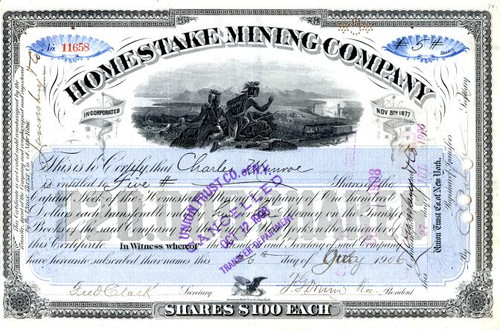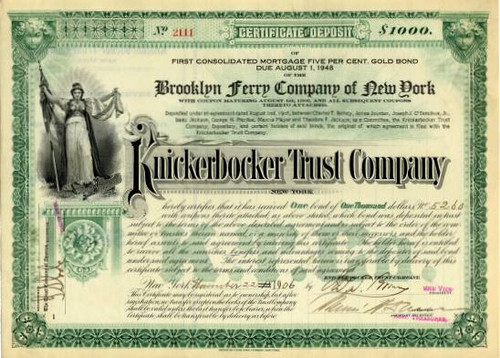Beautifully engraved certificate from the Pullman Company issued in 1906. This historic document was printed by the American Banknote Company and has an ornate border around it with a vignette of an eagle. This item has the signatures of the Company's President, Robert Todd Lincoln and Secretary, Aldeus Heused and is over 103 years old. Punch cancelled. 
Certificate Vignette 
Robert Todd Lincoln's Signature Robert Todd Lincoln (August 1, 1843 July 26, 1926) was an American lawyer and Secretary of War, and the first son of President Abraham Lincoln and Mary Todd Lincoln. Born in Springfield, Illinois, United States, he was the only one of Lincoln's four sons to live past his teenage years. Lincoln graduated from Phillips Exeter Academy in 1860, then studied at Harvard University from 1861 to 1864, where he was a member of Delta Kappa Epsilon (Alpha chapter). (Later in life, Lincoln also joined the Delta Chi fraternity.) He then enrolled in Harvard Law School but did not graduate. Much to the embarrassment of the president, Mary Todd Lincoln prevented Robert Lincoln from joining the Union Army until 1865. He held the rank of captain, serving in the last weeks of the American Civil War as part of General Ulysses S. Grant's immediate staff, a position which sharply minimized the likelihood that he would be involved in actual combat. He was present at Appomattox when Lee surrendered. Lincoln c. 1865Lincoln had a distant relationship with his father, in part because Abraham Lincoln spent months on the judicial circuit during his formative years. Robert would later say his most vivid image of his father was of his packing his saddlebags to prepare for his travels through Illinois.[1] Abraham Lincoln was proud of Robert and thought him bright, but also saw him as something of a competitor, and once said, "he guessed Bob would not do better than he had." The two lacked the strong bond Lincoln had with his sons Willie and Tad, but Robert deeply admired his father and wept openly at his deathbed. Following his father's assassination, in April 1865, Robert Lincoln moved with his mother and his brother Tad to Chicago, where Robert completed his law studies at the University of Chicago (a school different from but later assumed by the university presently known by that name). He was admitted to the bar on February 25, 1867. On September 24, 1868, Robert Lincoln married the former Mary Eunice Harlan (September 25, 1846 - March 31, 1937), the daughter of Senator James Harlan and Ann Eliza Peck of Mount Pleasant, Iowa. They had two daughters and one son: Mary "Mamie" Lincoln (October 15, 1869 - November 21, 1938) Abraham Lincoln II (nicknamed "Jack") (August 14, 1873 - March 5, 1890) Jessie Harlan Lincoln (November 6, 1875 - January 4, 1948) Robert Todd Lincoln's mansion Hildene in Manchester, Vermont.His mother's "spend-thrift" ways and eccentric behavior concerned Robert Lincoln. Fearing that his mother was a danger to herself, he was left with no choice but to have her committed to a psychiatric hospital in Batavia, Illinois in 1875. With his mother in the hospital, he was left with control of her finances. On May 20, 1875, she arrived at Bellevue Place, a private, upscale sanitarium in the Fox River Valley. [4] Three months after being installed in Bellevue Place, Mary Lincoln engineered her escape. She smuggled letters to her lawyer and his wife, who was not only her friend but also a feminist lawyer and fellow spiritualist. She also wrote to the editor of the Chicago Times, known for its sensational journalism. Soon, the public embarrassments Robert had hoped to avoid were looming, and his character and motives were in question. The director of Bellevue, who at Mary's trial had assured the jury she would benefit from treatment at his facility, now in the face of potentially damaging publicity declared her well enough to go to Springfield to live with her sister as she desired. [5] The committal proceedings led to a profound estrangement between Lincoln and his mother, and they never fully reconciled. Secretary of War (18811885) In 1877 he turned down President Rutherford B. Hayes' offer to appoint him Assistant Secretary of State, but later accepted an appointment as President James Garfield's Secretary of War, serving from 1881 to 1885 under Presidents Garfield and Chester A. Arthur. Chief Justice Taft, President Harding and Secretary Lincoln at the dedication of the Lincoln Memorial in 1922.Following his service as Secretary of War, Lincoln helped Oscar Dudley in establishing the Illinois Industrial Training School for Boys in Norwood Park in 1887, after Dudley discovered "more neglected and abandoned children on the streets than stray animals." The school relocated to Glenwood, Illinois in 1899. It first enrolled girls in 1998. Under the name Glenwood School for Boys & Girls, the school continues to operate as a haven for boys and girls whose parents are unable to care for them. Minister to the Court of St. James's Later, he served as the U.S. ambassador to the United Kingdom from 1889 to 1893 under President Benjamin Harrison, then returned to private business as a lawyer. Counsel, President and Chairman of the Pullman Palace Car Company He was general counsel under George Pullman, and was named president after Pullman's death in 1897. In 1911, Robert Lincoln became chairman of the board, a position he held until his death in 1926. A serious amateur astronomer, Lincoln constructed an observatory at his home in Manchester, Vermont, and equipped it with a refracting telescope that had a six-inch objective lens. Lincoln's telescope still exists; it has been restored and is used by a local astronomy club. Robert Lincoln made his last public appearance at the dedication ceremony in Washington, D.C. for his father's memorial on May 30, 1922. Presence at assassinations There is coincidence in regard to Robert Lincoln and presidential assassinations. He was either present or nearby when three of them occurred. Lincoln was invited to accompany his parents to the Ford's Theatre the night his father was shot by John Wilkes Booth on April 14, 1865. Citing fatigue from riding in a covered wagon for an extended period of time, he declined, and remained behind at the White House, where he immediately went to bed. He was informed of his father's being shot just before midnight. At President James A. Garfield's invitation, Lincoln was at the Sixth Street Train Station in Washington, D.C., where the President was shot by Charles J. Guiteau on July 2, 1881, and was an eyewitness to the event. Lincoln was serving as Garfield's Secretary of War at the time. At President William McKinley's invitation, Lincoln was at the Pan-American Exposition in Buffalo, New York, where the President was shot by Leon F. Czolgosz on September 6, 1901, though he was not an eyewitness to the event. Lincoln himself recognized the frequency of these coincidences. He is said to have refused a later presidential invitation with the comment "No, I'm not going, and they'd better not ask me, because there is a certain fatality about presidential functions when I am present." He did however, attend the dedication of the Lincoln Memorial in 1922 in the presence of President Warren G. Harding and former President William Howard Taft. Robert Lincoln and Edwin Booth In an odd coincidence, Robert Lincoln was once saved from possible serious injury or death by Edwin T. Booth, brother of John Wilkes Booth. The incident took place on a train platform in Jersey City, New Jersey. The exact date of the incident is uncertain, but it is believed to have taken place in late 1864 or early 1865, shortly before John Wilkes Booth's assassination of President Lincoln. Robert Lincoln recalled the incident in a 1909 letter to Richard Watson Gilder, editor of The Century Magazine: The incident occurred while a group of passengers were late at night purchasing their sleeping car places from the conductor who stood on the station platform at the entrance of the car. The platform was about the height of the car floor, and there was of course a narrow space between the platform and the car body. There was some crowding, and I happened to be pressed by it against the car body while waiting my turn. In this situation the train began to move, and by the motion I was twisted off my feet, and had dropped somewhat, with feet downward, into the open space, and was personally helpless, when my coat collar was vigorously seized and I was quickly pulled up and out to a secure footing on the platform. Upon turning to thank my rescuer I saw it was Edwin Booth, whose face was of course well known to me, and I expressed my gratitude to him, and in doing so, called him by name. Months later, while serving as an officer on the staff of General Ulysses S. Grant, Robert Lincoln recalled the incident to his fellow officer, Colonel Adam Badeau, who happened to be a friend of Edwin Booth. Badeau sent a letter to Booth, complimenting the actor for his heroism. Before receiving the letter, Booth had been unaware that the man whose life he had saved on the train platform had been the President's son. The incident was said to have been of some comfort to Edwin Booth following his brother's assassination of the President. Republican politics From 1884 to 1912, Lincoln's name was mentioned in varying degrees of seriousness as a candidate for the Republican presidential or vice-presidential nomination. At every turn, he adamantly disavowed any interest in running and stated he would not accept either position if nominated. Death Lincoln's sarcophagus at Arlington National CemeteryLincoln died at Hildene, his Vermont home, on July 26, 1926. He was later interred in Arlington National Cemetery[11] in a sarcophagus designed by the sculptor James Earle Fraser. He is buried with his wife Mary and their son Jack, who died of blood poisoning at the age of 16 in London, England. Lincoln was the last surviving member of both the Garfield and Arthur Cabinets. Of Robert's children, Jessie Harlan Lincoln Beckwith (1875 - 1948) had two children, Mary Lincoln Beckwith ["Peggy" 1898 - 1975] and Robert ("Bud") Todd Lincoln Beckwith (1904 - 1985), neither of whom had children of their own. Robert's other daughter, Mary Todd Lincoln ("Mamie") (1869 - 1938) married Charles Bradley Isham in 1891. They had one son, Lincoln Isham (1892 - 1971). Lincoln Isham married Leahalma Correa in 1919, but died without children. The last person known to be of direct Lincoln lineage, Robert's grandson "Bob" Beckwith, died in 1985. History from Wikipedia and OldCompany.com (old stock certificate research service).

Certificate Vignette

Robert Todd Lincoln's Signature








